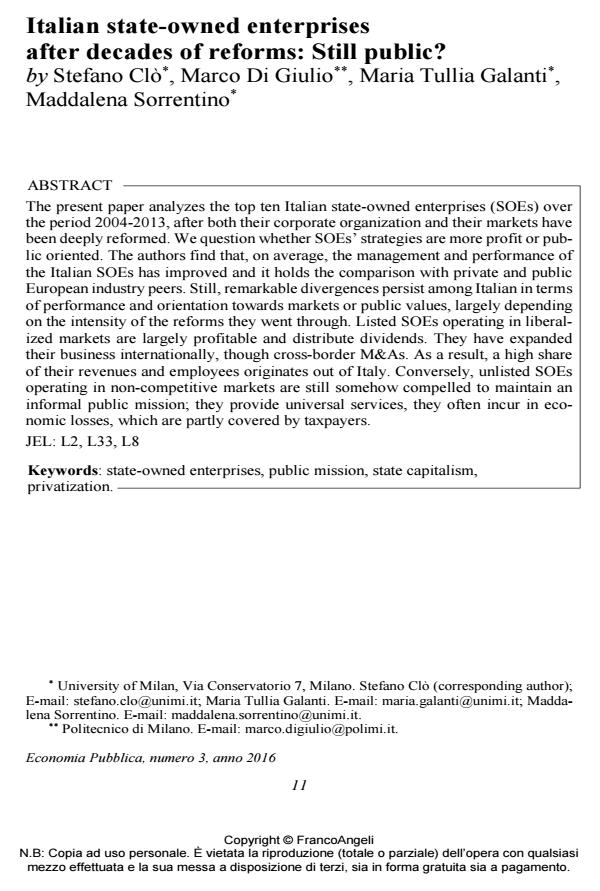Italian state-owned enterprises after decades of reforms: Still public?
Titolo Rivista ECONOMIA PUBBLICA
Autori/Curatori Stefano Clò, Marco Di Giulio, Maria Tullia Galanti, Maddalena Sorrentino
Anno di pubblicazione 2017 Fascicolo 2016/3
Lingua Inglese Numero pagine 39 P. 11-49 Dimensione file 391 KB
DOI 10.3280/EP2016-003002
Il DOI è il codice a barre della proprietà intellettuale: per saperne di più
clicca qui
Qui sotto puoi vedere in anteprima la prima pagina di questo articolo.
Se questo articolo ti interessa, lo puoi acquistare (e scaricare in formato pdf) seguendo le facili indicazioni per acquistare il download credit. Acquista Download Credits per scaricare questo Articolo in formato PDF

FrancoAngeli è membro della Publishers International Linking Association, Inc (PILA)associazione indipendente e non profit per facilitare (attraverso i servizi tecnologici implementati da CrossRef.org) l’accesso degli studiosi ai contenuti digitali nelle pubblicazioni professionali e scientifiche
The present paper analyzes the top ten Italian state-owned enterprises (SOEs) over the period 2004-2013, after both their corporate organization and their markets have been deeply reformed. We question whether SOEs’ strategies are more profit or public oriented. The authors find that, on average, the management and performance of the Italian SOEs has improved and it holds the comparison with private and public European industry peers. Still, remarkable divergences persist among Italian in terms of performance and orientation towards markets or public values, largely depending on the intensity of the reforms they went through. Listed SOEs operating in liberalized markets are largely profitable and distribute dividends. They have expanded their business internationally, though cross-border M&As. As a result, a high share of their revenues and employees originates out of Italy. Conversely, unlisted SOEs operating in non-competitive markets are still somehow compelled to maintain an informal public mission; they provide universal services, they often incur in economic losses, which are partly covered by taxpayers.
Parole chiave:State-owned enterprises, public mission, state capitalism, privatization
Jel codes:L2, L33, L8
- Optimal Share of Privatisation in a Public Monopoly with Unionised Workers Luciano Fanti, Domenico Buccella, in Politická ekonomie /2021 pp.511
DOI: 10.18267/j.polek.1328 - Concilier le profit et l’intérêt général : l’État actionnaire dans les dynamiques historiques du capitalisme Hadrien Coutant, Antoine Ducastel, Scott Viallet-Thévenin, in Revue de la régulation /2021
DOI: 10.4000/regulation.20029 - Sur les chemins de la normalisation Hadrien Coutant, Jean Finez, Scott Viallet-Thévenin, in Revue française de sociologie /2021 pp.341
DOI: 10.3917/rfs.613.0341 - Selling the jewels: patient capital, state-business relations, and the privatization of strategic utilities in Italy and Spain Fabio Bulfone, in Review of International Political Economy /2024 pp.1347
DOI: 10.1080/09692290.2023.2284323 - Rationales, performance and governance of public entreprises. Editorial introduction Luc Bernier, Massimo Florio, Johan Willner, in ECONOMIA PUBBLICA 3/2017 pp.5
DOI: 10.3280/EP2016-003001 - The state as an eager shareholder Hadrien Coutant, Scott Viallet-Thévenin, in Revue de la régulation /2021
DOI: 10.4000/regulation.19589
Stefano Clò, Marco Di Giulio, Maria Tullia Galanti, Maddalena Sorrentino, Italian state-owned enterprises after decades of reforms: Still public? in "ECONOMIA PUBBLICA " 3/2016, pp 11-49, DOI: 10.3280/EP2016-003002